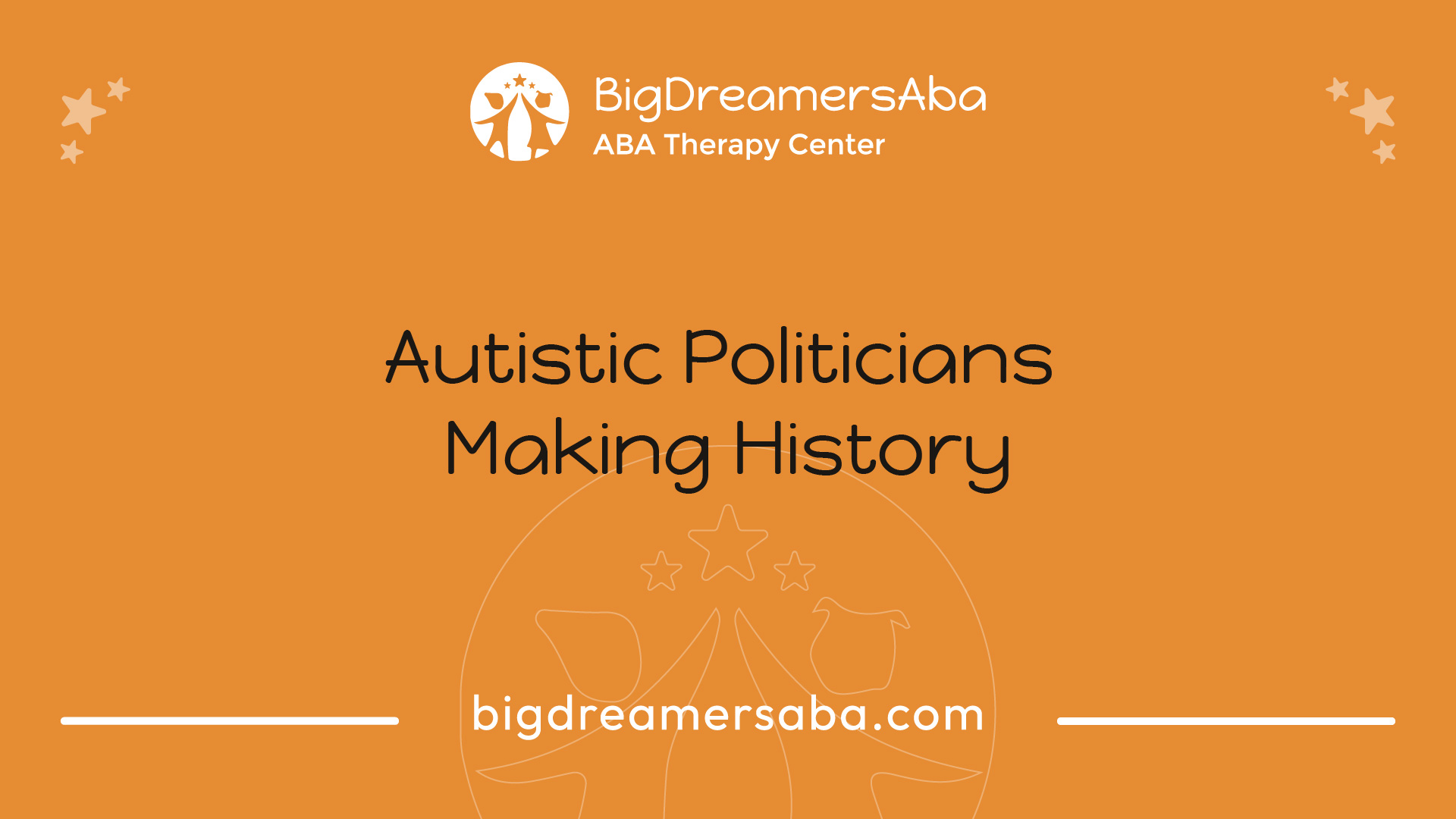Famous Politicians with Autism
Discover famous politicians with autism and their impactful contributions to a more inclusive political landscape.


Unique Perspectives in Politics
Navigating Neurodiversity
Politicians with autism offer unique perspectives on governance and policy-making, emphasizing the importance of neurodiversity in society. Their experiences enable them to navigate complex issues related to autism awareness, advocacy, and inclusion. For instance, Temple Grandin, an autism advocate and animal behavior expert, has authored several books and delivered influential speeches that inspire many on the autism spectrum.
Individuals like Grandin and others not only contribute to the political landscape but also highlight the need for inclusive policies that represent diverse populations. The drive for awareness and understanding of autism helps shift the narrative towards acceptance and support in various sectors, including education and healthcare.
Contributions to Governance
Famous politicians with autism, such as Taro Yamamoto and Rosie Winterton, have made significant contributions to their communities and governance. Yamamoto, a former member of the Japanese parliament, advocated for causes like anti-nuclear power and LGBTQ+ rights, showcasing how diverse experiences can influence progressive policies [2].
Winterton, a British Member of Parliament, has focused her efforts on education, healthcare, and social justice, championing public services and policies that assist disadvantaged communities [2].
These contributions are essential as they underscore the importance of representation and equality in political arenas. The presence of autistic politicians can inspire inclusive discussions and help shape policies that cater to the needs of all citizens, ultimately fostering a more equitable society.
PoliticianCountryKey Advocacy AreasTemple GrandinUSAAutism awareness, animal welfareTaro YamamotoJapanAnti-nuclear power, LGBTQ+ rightsRosie WintertonUKEducation, healthcare, social justice
This table illustrates the impact that autistic politicians can have through their diverse advocacy areas. Their roles in governance are pivotal in breaking barriers and promoting a more inclusive environment for all.
Famous Politicians with Autism
Understanding the contributions of famous politicians with autism helps shine a light on neurodiversity in governance. This section highlights several notable figures who have made significant impacts across various political landscapes.
Michael John Carley
Michael John Carley is an American author and autism advocate. He is the founder and executive director of the Global and Regional Asperger Syndrome Partnership (GRASP). Carley has published works aimed at providing insights into the autistic experience, including his book "Asperger's From the Inside-Out" [2]. His contributions have been vital in raising awareness about autism and advocating for the rights of individuals on the spectrum.
Taro Yamamoto
Taro Yamamoto, born on June 20, 1974, in Tokyo, Japan, is a prominent Japanese actor, filmmaker, and politician. He was a member of the Japanese parliament from 2013 to 2019, where he advocated for issues such as anti-nuclear power, LGBTQ+ rights, and constitutional reform [2]. Yamamoto's unique perspective as an autistic individual has influenced his political agenda, promoting diversity and inclusion.
Anja Hazekamp
Anja Hazekamp, born on September 21, 1968, in Winschoten, Netherlands, is a Dutch politician recognized for her work as an animal rights activist. Since 2014, she has served as a Member of the European Parliament, focusing on animal welfare and environmental issues [2]. Hazekamp's commitment to these causes reflects her dedication to promoting ethical treatment of animals.
Rosie Winterton
Rosie Winterton is a British politician who serves as the Member of Parliament for Doncaster Central. Throughout her political career, she has prioritized education, healthcare, and social justice, advocating for public services and policies that support disadvantaged communities [2]. Her work emphasizes the importance of equality and accessibility in public life.
Emma Dalmayne
Emma Dalmayne, born in 1975 in London, England, is a British autism rights activist and writer. As a vocal critic of controversial treatments for autism, she has penned numerous books addressing the experiences of raising autistic children. Dalmayne's activism highlights the need for informed approaches to autism support.
Temple Grandin
Temple Grandin is a renowned scientist and autism advocate, known for her work in animal science and behavior. As a prominent figure who has written extensively about her experiences with autism, Grandin has contributed to public understanding of the condition and the unique perspectives that come with it. Her advocacy underlines the value of neurodiversity in fields such as agriculture and animal welfare.
These politicians not only represent themselves but also serve as beacons for others with autism, showing how diverse minds can lead to innovative policies and inclusive governance. For further exploration of autism-related issues, visit our topics on air pollution and autism or calming strategies for kids with autism.
Impact on Policy-Making

Advocacy for Autism Rights
Famous politicians with autism have taken significant steps in advocating for autism rights, shedding light on the unique strengths and abilities of autistic individuals. These leaders actively challenge negative stereotypes associated with autism. They demonstrate that the autism spectrum does not impede one's effectiveness as a politician. According to a source, these politicians prove that their unique perspectives often lead to valuable contributions in governance.
Advocacy efforts typically focus on promoting policies that provide support for individuals with autism and their families. Autistic politicians highlight issues such as access to education, employment opportunities, and healthcare that specifically address the needs of the autism community. Their lived experiences empower them to speak out on behalf of others, making substantial changes in legislation that promote inclusivity and understanding.
Challenging Stereotypes
Autistic politicians also play a crucial role in challenging stereotypes surrounding neurodiversity. By occupying visible positions in political arenas, they showcase their distinct approaches to problem-solving and decision-making. This often involves leveraging their attention to detail and ability to think outside the box to identify innovative solutions to complex issues [4].
The presence of autistic individuals in leadership positions serves to dispel misconceptions about autism, promoting a broader acceptance of neurodiversity within society. By sharing their stories and experiences, they inspire others to recognize the valuable contributions of all individuals, regardless of their neurodivergent traits. Through advocacy and challenging stereotypes, these politicians not only influence policy-making but also foster a greater understanding and acceptance of autism in various sectors of society.
The impact of autistic politicians reflects a significant shift in the political landscape, showcasing the importance of representation and inclusivity across governance. By recognizing their capabilities, society can move towards a more inclusive and understanding future.
Political Landscape and Autism
Autism Awareness in Politics
In recent years, there has been a marked increase in autism awareness within the political landscape. Prominent political figures have begun to address autism as a critical issue, aiming to highlight the challenges faced by individuals with autism and their families. In previous presidential elections, candidates such as Hillary Clinton and Donald Trump emphasized the need for comprehensive policies to support those with autism and their families. This shift in focus reflects a growing commitment to addressing autism at the governmental level.
Both major political parties in the United States have varying approaches toward autism advocacy. The Democratic Party traditionally prioritizes policies that benefit individuals with disabilities, including autism, pushing for increased funding for research and early intervention services [5]. Meanwhile, the Republican Party emphasizes individual responsibility and self-sufficiency, advocating for employment opportunities for adults with autism [5].
Support for Neurodiversity
Support for neurodiversity has also gained traction among various political actors. Neurodiversity advocates promote the understanding that neurological differences, such as autism, should be recognized and appreciated as part of human diversity rather than being merely viewed as disorders. Canadian initiatives, such as the National Autism Strategy and the Canada Autism Partnership, have made significant strides in creating policies that recognize the importance of addressing the needs of individuals with autism and fostering inclusive societies [5].
Organizations like the Autism Society have been pivotal in advocating for legislation that enhances the quality of life for autistic individuals and their families. They ensure that the rights of individuals with autism are protected and that the implications of various laws are conveyed clearly to the community. This commitment to supporting neurodiversity reflects a broader understanding that enhancing autism awareness is essential for fostering an inclusive society that embraces all forms of diversity.
As awareness continues to grow, the involvement of famous politicians with autism in the political process is expected to influence public perceptions and policies in meaningful ways.
Autistic Politicians Making History

Autistic politicians have made significant strides in their respective fields, contributing to governance and advocating for inclusive policies. Their unique perspectives enrich the political landscape, fostering greater awareness and understanding of autism.
Noteworthy Contributions
Michael John Carley is an American author and autism advocate, known for openly sharing his diagnosis of Asperger's syndrome. He has run for public office in New York City and through his advocacy work, he promotes understanding and accommodations for individuals with autism. Carley's writings and public speaking have made him a prominent figure in the autism community.
Another notable figure is Rosie Winterton, a British politician and Member of Parliament (MP) for the Doncaster Central constituency since 1997. Although her autism diagnosis became public later in her career, Winterton has championed issues in health, education, and social justice, addressing the needs of marginalized communities.
Jessica Benham stands out as the first openly autistic woman elected to the Pennsylvania State Legislature. With a background in public health and disability studies, she has focused on disability rights and social justice through her legislative efforts, sponsoring bills that address important disability issues.
Among renowned advocates is Temple Grandin, an autism advocate and animal behavior expert. Grandin has authored numerous books and delivered influential speeches, serving as a role model for individuals on the autism spectrum.
PoliticianContributionsMichael John CarleyAdvocacy for autism understanding and accommodationRosie WintertonFocus on health, education, and social justiceJessica BenhamDisability rights and sponsorship of relevant billsTemple GrandinAuthorship and inspirational advocacy
Shaping Inclusive Policies
Autistic politicians play a crucial role in shaping policies that promote inclusivity. Their experiences allow them to challenge stereotypes and advocate for necessary changes within legislative frameworks. For instance, Jessica Benham's work in the Pennsylvania State Legislature highlights the importance of representation in addressing disability rights.
Vernon Smith, a Nobel Prize-winning economist diagnosed with Asperger's syndrome, exemplifies the diverse contributions autistic individuals can make. His focus on experimental economics has contributed significantly to understanding market behavior, promoting economic policies that enhance societal well-being.
These politicians demonstrate the impact of neurodiversity in governance and decision-making. Their efforts toward inclusivity resonate in various forms, from advocating for education reforms to addressing health disparities.
Through their dedication, autistic politicians inspire a shift towards more inclusive and understanding policies, encouraging society to embrace diversity. The progress made by these individuals stands as a testament to the potential of representation in affecting meaningful change.
For more information on how various aspects of autism influence political engagement, explore related topics such as air pollution and autism and self-diagnosed autism.
Embracing Diversity in Representation
Breaking Barriers
The emergence of famous politicians with autism highlights a significant shift toward inclusivity in governance. As more individuals openly disclose their autism diagnoses, they challenge stereotypes and inspire others within the neurodiverse community. Politicians like Yuh-Line Niou, who represents Chinatown in the New York State Legislature, advocate for critical issues such as affordable housing and immigrant rights while also addressing their own experiences with autism and mental health.
Additionally, Jessica Benham made history as the first openly autistic woman elected to the Pennsylvania State Legislature. Her background in public health and disability studies enhances her advocacy for disability rights and social justice.
This representation not only breaks barriers for those with autism but serves as a platform for broader discussions about diversity in political landscapes, emphasizing the importance of varied perspectives within decision-making bodies.
Creating an Inclusive Society
The presence of autistic individuals in politics fosters an inclusive society that values diverse experiences and viewpoints. Politicians like Pete Buttigieg, who publicly shared his Asperger's syndrome diagnosis during a presidential campaign, contributed to increasing awareness and acceptance of neurodiversity in high-pressure environments [9].
Rosie Winterton, a longtime British MP, has also been an advocate for health, education, and social justice, proving that autism can coexist with effective leadership.
Autistic politicians help pave the way for an inclusive society by creating policies that consider the needs and rights of all individuals, reinforcing the idea that diverse representation is essential for truly representative governance. This progress creates an environment where everyone's voice, especially those from marginalized groups, can be heard and valued.
References
[2]:
[3]:
[4]:
[5]:
[6]:
[7]:
[8]:
[9]:
Recent articles

Why Center-Based ABA Therapy Is a Game-Changer for Urban Families

Best ABA Therapy Isn’t Always the Most Expensive—Here’s Why
